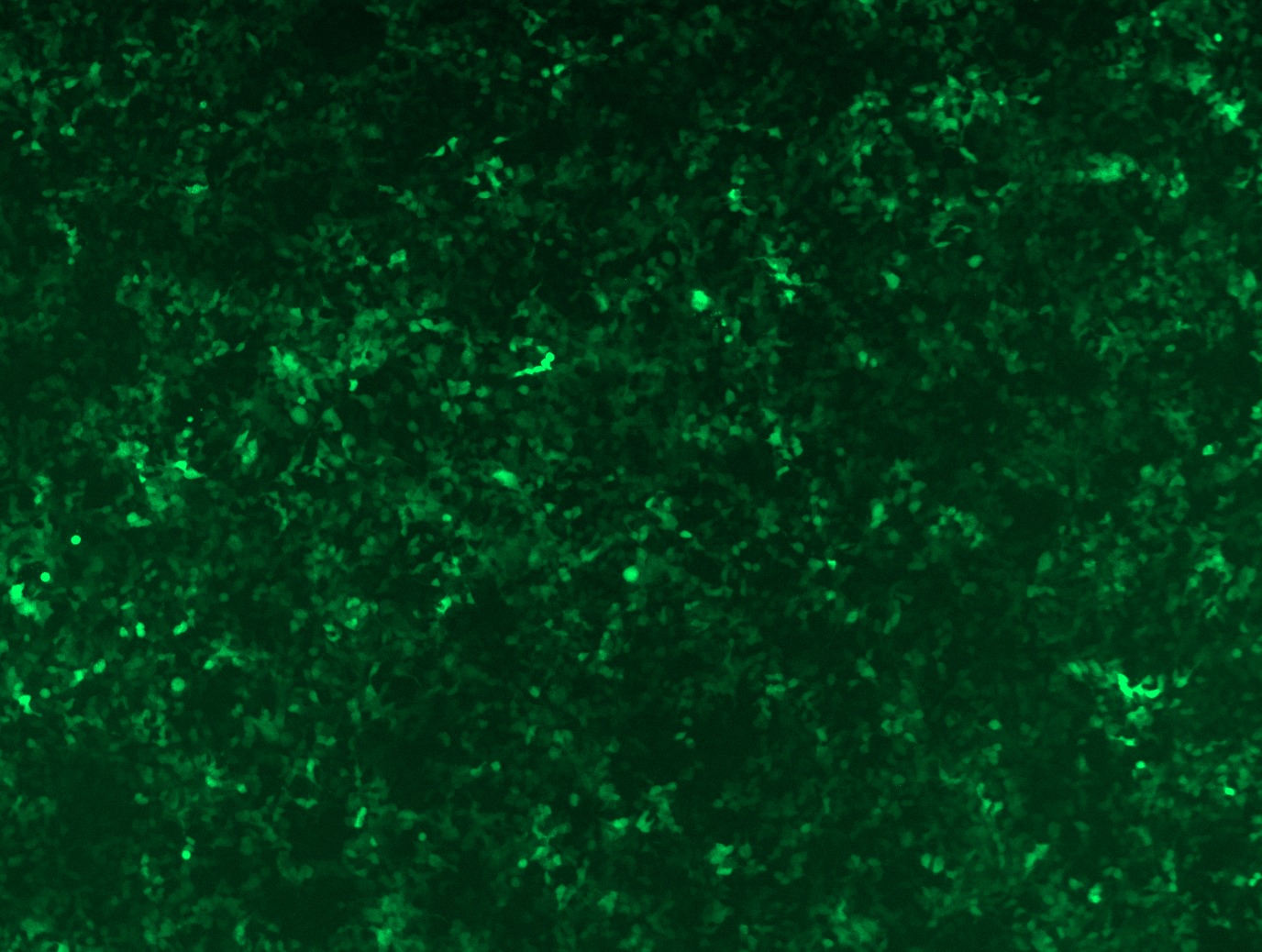Lyn Mouse shRNA Lentiviral Particle (Locus ID 17096)
CAT#: TL501282V
Lyn - Mouse shRNA lentiviral particles (4 unique 29mer target-specific shRNA, 1 scramble control), 0.5 ml each, >10^7 TU/ml.
Frequently bought together (2)
Other products for "Lyn"
Specifications
| Product Data | |
| Locus ID | 17096 |
| Synonyms | AA407514; Hck-2; p53Lyn; p56Lyn |
| Vector | pGFP-C-shLenti |
| Format | Lentiviral particles |
| RefSeq | BC003253, BC031547, NM_001111096, NM_010747, NM_001111096.1, NM_010747.1, NM_010747.2, BC157998 |
| UniProt ID | P25911 |
| Summary | Non-receptor tyrosine-protein kinase that transmits signals from cell surface receptors and plays an important role in the regulation of innate and adaptive immune responses, hematopoiesis, responses to growth factors and cytokines, integrin signaling, but also responses to DNA damage and genotoxic agents. Functions primarily as negative regulator, but can also function as activator, depending on the context. Required for the initiation of the B-cell response, but also for its down-regulation and termination. Plays an important role in the regulation of B-cell differentiation, proliferation, survival and apoptosis, and is important for immune self-tolerance. Acts downstream of several immune receptors, including the B-cell receptor, CD79A, CD79B, CD5, CD19, CD22, FCER1, FCGR2, FCGR1A, TLR2 and TLR4. Plays a role in the inflammatory response to bacterial lipopolysaccharide. Mediates the responses to cytokines and growth factors in hematopoietic progenitors, platelets, erythrocytes, and in mature myeloid cells, such as dendritic cells, neutrophils and eosinophils. Acts downstream of EPOR, KIT, MPL, the chemokine receptor CXCR4, as well as the receptors for IL3, IL5 and CSF2. Plays an important role in integrin signaling. Regulates cell proliferation, survival, differentiation, migration, adhesion, degranulation, and cytokine release. Down-regulates signaling pathways by phosphorylation of immunoreceptor tyrosine-based inhibitory motifs (ITIM), that then serve as binding sites for phosphatases, such as PTPN6/SHP-1, PTPN11/SHP-2 and INPP5D/SHIP-1, that modulate signaling by dephosphorylation of kinases and their substrates. Phosphorylates LIME1 in response to CD22 activation. Phosphorylates BTK, CBL, CD5, CD19, CD72, CD79A, CD79B, CSF2RB, DOK1, HCLS1, LILRB3/PIR-B, MS4A2/FCER1B, SYK and TEC. Promotes phosphorylation of SIRPA, PTPN6/SHP-1, PTPN11/SHP-2 and INPP5D/SHIP-1. Required for rapid phosphorylation of FER in response to FCER1 activation. Mediates KIT phosphorylation. Acts as an effector of EPOR (erythropoietin receptor) in controlling KIT expression and may play a role in erythroid differentiation during the switch between proliferation and maturation. Depending on the context, activates or inhibits several signaling cascades. Regulates phosphatidylinositol 3-kinase activity and AKT1 activation. Regulates activation of the MAP kinase signaling cascade, including activation of MAP2K1/MEK1, MAPK1/ERK2, MAPK3/ERK1, MAPK8/JNK1 and MAPK9/JNK2. Mediates activation of STAT5A and/or STAT5B. Phosphorylates LPXN on 'Tyr-72'. Kinase activity facilitates TLR4-TLR6 heterodimerization and signal initiation.[UniProtKB/Swiss-Prot Function] |
| shRNA Design | These shRNA constructs were designed against multiple splice variants at this gene locus. To be certain that your variant of interest is targeted, please contact techsupport@origene.com. If you need a special design or shRNA sequence, please utilize our custom shRNA service. |
| Performance Guaranteed | OriGene guarantees that the sequences in the shRNA expression cassettes are verified to correspond to the target gene with 100% identity. One of the four constructs at minimum are guaranteed to produce 70% or more gene expression knock-down provided a minimum transfection efficiency of 80% is achieved. Western Blot data is recommended over qPCR to evaluate the silencing effect of the shRNA constructs 72 hrs post transfection. To properly assess knockdown, the gene expression level from the included scramble control vector must be used in comparison with the target-specific shRNA transfected samples. For non-conforming shRNA, requests for replacement product must be made within ninety (90) days from the date of delivery of the shRNA kit. To arrange for a free replacement with newly designed constructs, please contact Technical Services at techsupport@origene.com. Please provide your data indicating the transfection efficiency and measurement of gene expression knockdown compared to the scrambled shRNA control (Western Blot data preferred). |
Documents
| Product Manuals |
| FAQs |
| SDS |
Resources
| RNAi Resources |
{0} Product Review(s)
0 Product Review(s)
Submit review
Be the first one to submit a review
Product Citations
*Delivery time may vary from web posted schedule. Occasional delays may occur due to unforeseen
complexities in the preparation of your product. International customers may expect an additional 1-2 weeks
in shipping.






























































































































































































































































 Germany
Germany
 Japan
Japan
 United Kingdom
United Kingdom
 China
China



![GFP signal was observed under microscope at 48 hours after transduction of [TL501282C] virus into HEK293 cells. [TL501282C] virus was prepared using lenti-shRNA [TL501282C] and TR30037 packaging kit.](https://cdn.origene.com/assets/images/rnai/shrna-lentiviral-particle/100/tl501282vc.jpg?d=110x110)